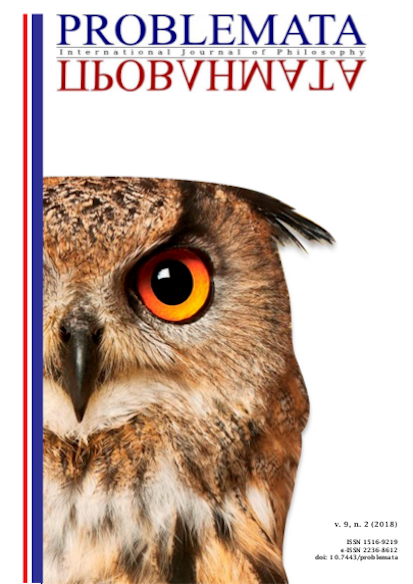CYNIC NATURALISM IN MONTAIGNE: THE DISJUNCTION BETWEEN PHYSIS AND NOMOS IN ESSAYS.
DOI:
https://doi.org/10.7443/problemata.v9i2.38247Keywords:
Essays, Montaigne, Cynicism, NatureAbstract
Montaigne's Essays take up some aspects of cynical naturalism by proposing an inversion of social values and an inner harmony of acts in accordance with the particular nature of each individual. For the one who takes care of himself, like Socrates and the cynics, the essential thing is not in customs, appearances and comfort, but in freedom. Combining wisdom and primitive force like Diogenes of Sinope, Montaigne erects a personal ethic or art of living that is based on autonomy, that is, in the development of his own norms, having as a guide the experimental knowledge represented by the cynical theater of the animals, of the cannibals , as well as of his own nature. In opposition to the fickle and uncertain world of opinions, Montaigne takes sides with nature, whence he elicits his model of frugality, moderation, and freedom. Montaigne's philosophy is existential and stems from reflection on the truth of the inner desires that must be under the command of reason. In the cynical way, he seeks the happiness that is conceived in the choice of true values, simple and respectful of freedom.
Downloads
References
ARTAZA, Elena. Antología de textos retóricos españoles del siglo XVI. Bilbao: Universidade de Deusto, 1997.
BOUVERESSE, Jacques. Racionalité y cynisme. Paris : Minuit, 1984.
CARABIN, Denise. Les idées stoïciennes dans la littérature morale des XVIe. Et XVIIe Siècles (1575-1642). Paris : Honoré Champion, 2004.
CARNEIRO, Alexandre Soares. “Exercícios espirituais e parrhesia nos Ensaios de Montaigne” In: Revista de Filosofia Aurora, Curitiba, v.23, n.32, pp.113-129, jan/jun de 2011.
CLÉMENT, Michèle. Le cynisme a la renaissance: d’Erasmo à Montaigne. Genebra : DROZ, 2005.
______. “Montaigne et les cyniques : peut-on s’avancer masqué quand on se réclame du cynisme?”. In : Nouveau Bulletin de la société des amis de Montaigne, 2007, pp. 43-58.
COMTE-SPONVILLE, André. Valor e verdade. Trad. Eduardo Brandão. São Paulo : Martins Fontes, 2008.
DHERBEY, Gilbert Romeyer. Les sophistes. Paris: Universidade da França, 1985.
FONTENAY, Elisabeth de. « Grâce et béniggnité (Montaigne). In: Le silence des bêtes : la philosophie à l'épreuve de l’animalité. Paris:Arthème Fayard, 1998.
GOULET-CAZÉ, Marie-Odile. La ascèse cynique: um commentaire de Diogène Laërce VI 70-71. Paris: J. Vrin, 1986.
HADOT, Pierre. O que é a filosofia antiga? Trad. Davi Macedo. São Paulo: Loyola, 1995.
______. La philosophie comme manière de vivre: entretiens avec Jeannie Carlier et Arnold I. Davidson. Paris : Albin, 2001.
______. Exercícios espirituais e filosofia antiga. Trad. Flavio Fontenelle Loque Loraine Oliveira. São Paulo : Atual, 2014.
HUSSON, Suzanne. La république de Diogène : une cité en quête de la nature. Paris : J.Vrin, 2015.
JENOFONTE. Recuerdos de Sócrates. Trad. Juan Zaragoza. Madri: Gredos, 1993.
LAÉRCIO, Diógenes. Vidas opiniones y sentencias de los filósofos más ilustres. Trad. José Ortiz y Sanz. Buenos Aires: El Ateneo, 1947.
MARTÍN GARCÍA, J. A. Los filósofos cínicos y la literatura moral serioburlesca. Madri: Akal, 2008.
MONTAIGNE, Michel. Os Ensaios. Tomos I, II, III. Trad. Rosemary Costhek Abílio. São Paulo: Martins Fontes, 2001.
SCHNEEWIND, J. B. A invenção da autonomia: uma história da filosofia moral moderna. Trad. Magda França Lopes. Rio Grande do Sul: Unisinos, 2005.
Downloads
Published
Issue
Section
License
Authors who publish with this journal agree to the following terms:
- Authors retain copyright and grant the journal right of first publication with the work simultaneously licensed under a Creative Commons Attribution License that allows others to share the work with an acknowledgement of the work's authorship and initial publication in this journal.
- Authors are able to enter into separate, additional contractual arrangements for the non-exclusive distribution of the journal's published version of the work (e.g., post it to an institutional repository or publish it in a book), with an acknowledgement of its initial publication in this journal.
-
- Authors are permitted and encouraged to post their work online (e.g., in institutional repositories or on their website) prior to and during the submission process, as it can lead to productive exchanges, as well as earlier and greater citation of published work (See The Effect of Open Access).





